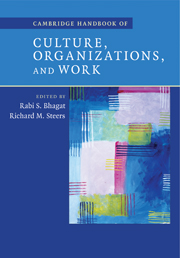Book contents
- Frontmatter
- Contents
- List of figures
- List of tables
- List of contributors
- Preface
- PART I CULTURAL FOUNDATIONS
- PART II CULTURE AND ORGANIZATION THEORY
- PART III CULTURE AND ORGANIZATIONAL BEHAVIOR
- 9 Understanding leadership across cultures
- 10 Global leadership: progress and challenges
- 11 The role of cultural elements in virtual teams
- 12 Cultural drivers of work behavior: personal values, motivation, and job attitudes
- 13 Interdisciplinary perspectives on culture, conflict, and negotiation
- 14 The complexity of trust: cultural environments, trust, and trust development
- 15 Cultural variations in work stress and coping in an era of globalization
- 16 Cultural values and women's work and career experiences
- 17 Intercultural training for the global workplace: review, synthesis, and theoretical explorations
- PART IV FUTURE DIRECTIONS IN THEORY AND RESEARCH
- Index
14 - The complexity of trust: cultural environments, trust, and trust development
Published online by Cambridge University Press: 15 December 2009
- Frontmatter
- Contents
- List of figures
- List of tables
- List of contributors
- Preface
- PART I CULTURAL FOUNDATIONS
- PART II CULTURE AND ORGANIZATION THEORY
- PART III CULTURE AND ORGANIZATIONAL BEHAVIOR
- 9 Understanding leadership across cultures
- 10 Global leadership: progress and challenges
- 11 The role of cultural elements in virtual teams
- 12 Cultural drivers of work behavior: personal values, motivation, and job attitudes
- 13 Interdisciplinary perspectives on culture, conflict, and negotiation
- 14 The complexity of trust: cultural environments, trust, and trust development
- 15 Cultural variations in work stress and coping in an era of globalization
- 16 Cultural values and women's work and career experiences
- 17 Intercultural training for the global workplace: review, synthesis, and theoretical explorations
- PART IV FUTURE DIRECTIONS IN THEORY AND RESEARCH
- Index
Summary
The topic of trust has spawned a vast literature across multiple academic fields of inquiry and has produced some of the most cited papers within the field of management alone (e.g. Mayer, davis, and Schoorman, 1995). Yet in many ways, the state of our understanding of trust development is similar to the story of the group of blind men touching different parts of an elephant. First, while we know many things about trust, there is little understanding of how the pieces of knowledge fit together. Second, significant stages within the trust development process remain virtually unexplored. Third, there is little recognition that the whole is likely much more complex than the sum of the parts. That is, trust development is dynamic and fluid, changing in nature from context to context, and is influenced by a multiplicity of economic, sociological, psychological and political factors in the cultural environment of the trust relationship.
An example of failure in the trust literature to integrate knowledge is that we seldom simultaneously examine the internal psychology of the trustor (McAllister, 1995; Jeffries and Reid, 2000) in conjunction with the external social context of trust relationships (Cook, Hardin, and Levi, 2005)). For example, the internal psychology of the trustor (whether relatively more rationally or intuitvely based) and the external social context of the relationship (whether perhaps a legal contract versus a relational one exists between partners) must be studied in conjunction because they are likely to interact with and influence the nature of trust extended, the attributions made regarding the trustworthiness of the partner, and ultimately, the potential for future growth trust or decline.
- Type
- Chapter
- Information
- Cambridge Handbook of Culture, Organizations, and Work , pp. 373 - 417Publisher: Cambridge University PressPrint publication year: 2009
- 7
- Cited by



